-
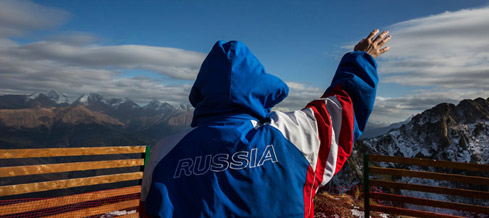 INTRODUCTIONIn February and March 2014, Russia will host the Winter Olympic and Paralympic Games in the city of Sochi. For Russia's leaders the Olympics are an opportunity to showcase their ability to organize major events and burnish the country's international image. With the awarding of the Olympics, Sochi has undergone a transformation that will turn it into what Russian officials describe as a "premier winter sports destination," with gleaming new Olympic venues being built both in Sochi and the nearby Caucasus Mountains. But this transformation has also come at a cost to many Sochi residents and many of the migrant workers who have arrived in Russia to help build the new Sochi.Read more »
INTRODUCTIONIn February and March 2014, Russia will host the Winter Olympic and Paralympic Games in the city of Sochi. For Russia's leaders the Olympics are an opportunity to showcase their ability to organize major events and burnish the country's international image. With the awarding of the Olympics, Sochi has undergone a transformation that will turn it into what Russian officials describe as a "premier winter sports destination," with gleaming new Olympic venues being built both in Sochi and the nearby Caucasus Mountains. But this transformation has also come at a cost to many Sochi residents and many of the migrant workers who have arrived in Russia to help build the new Sochi.Read more »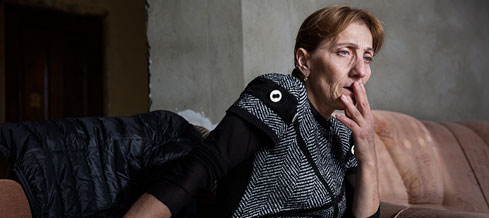 environment and healthThe Kaladjians' home was severely damaged by a landslide apparently caused by illegal dumping of construction waste above Bakinskaya Street, in Veseloe, Sochi. Environmental experts believe the nature of the waste strongly suggests it is from buildings demolished to make way for Olympic construction. The house is too dangerous to live in, but the family has not received any form of compensation. The family refused the authorities' offer of temporary resettlement to dormitory-style accommodations in a large apartment block, which they feel is not appropriate for their family of eight.Read more »
environment and healthThe Kaladjians' home was severely damaged by a landslide apparently caused by illegal dumping of construction waste above Bakinskaya Street, in Veseloe, Sochi. Environmental experts believe the nature of the waste strongly suggests it is from buildings demolished to make way for Olympic construction. The house is too dangerous to live in, but the family has not received any form of compensation. The family refused the authorities' offer of temporary resettlement to dormitory-style accommodations in a large apartment block, which they feel is not appropriate for their family of eight.Read more »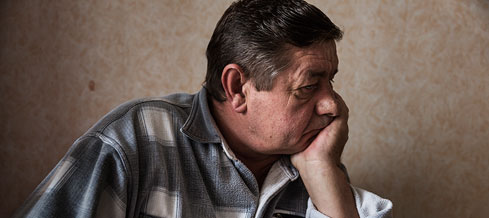 forced evictionsIn September 2012, Sergei Khlistov and his family, including two grandchildren, ages 3 and 8, were forcibly evicted and their home bulldozed as part of Russia's preparations to host the Olympic Games. The Khlistovs had paid taxes on their modest two-story home of 16 years and had farmed an adjacent small plot of land. In 2011, as part of the Olympic development plans, the authorities deemed Khlistov's home "illegal," sued him, and won a court order to demolish the home without providing any form of compensation to the family for that property.Read more »
forced evictionsIn September 2012, Sergei Khlistov and his family, including two grandchildren, ages 3 and 8, were forcibly evicted and their home bulldozed as part of Russia's preparations to host the Olympic Games. The Khlistovs had paid taxes on their modest two-story home of 16 years and had farmed an adjacent small plot of land. In 2011, as part of the Olympic development plans, the authorities deemed Khlistov's home "illegal," sued him, and won a court order to demolish the home without providing any form of compensation to the family for that property.Read more »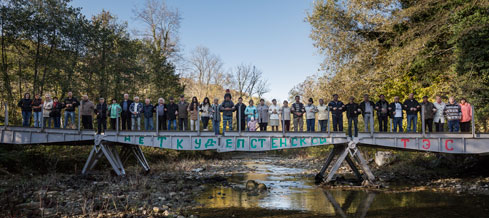 environment and healthA component of infrastructure development in Sochi in advance of the Olympic Games is what is projected to be the largest natural gas power station in the world. Prior to completion of environmental review and other procedures required by law to start construction, workers built a bridge, cut trees, and put up a large fence at the power plant site. Residents painted "No to the Kudepsta power station!" on the bridge. Residents fear pollution, devaluation of properties, and devastation of the natural landscape and of the town's appeal as a tourist destination.Read more »
environment and healthA component of infrastructure development in Sochi in advance of the Olympic Games is what is projected to be the largest natural gas power station in the world. Prior to completion of environmental review and other procedures required by law to start construction, workers built a bridge, cut trees, and put up a large fence at the power plant site. Residents painted "No to the Kudepsta power station!" on the bridge. Residents fear pollution, devaluation of properties, and devastation of the natural landscape and of the town's appeal as a tourist destination.Read more »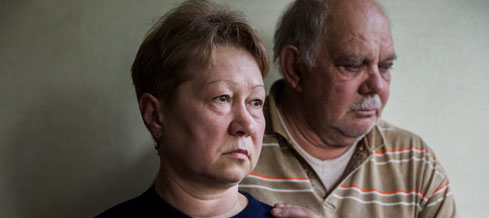 forced evictionsAlexander Mzokov, his wife, and two sons lived with eight of their relatives in a three-story home in Sochi. In April 2012, they learned that the authorities would demolish their home of 13 years to make way for a road providing key transportation infrastructure for the Olympic Games. Although the Mzokovs had full legal title to the house and the land on which it stood, the authorities sued them for constructing an "illegal structure" and on appeal, won a court order to demolish the house, doing so on October 4, 2012. The authorities refused to provide the family with compensation.Read more »
forced evictionsAlexander Mzokov, his wife, and two sons lived with eight of their relatives in a three-story home in Sochi. In April 2012, they learned that the authorities would demolish their home of 13 years to make way for a road providing key transportation infrastructure for the Olympic Games. Although the Mzokovs had full legal title to the house and the land on which it stood, the authorities sued them for constructing an "illegal structure" and on appeal, won a court order to demolish the house, doing so on October 4, 2012. The authorities refused to provide the family with compensation.Read more »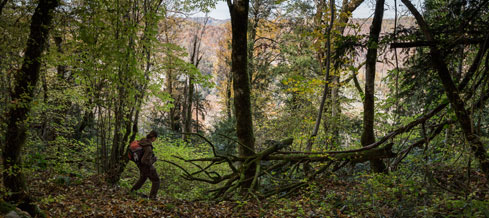 civil societyThe Russian Geographical Society is Russia's oldest and one of its most respected scientific societies, founded in 1845. The Sochi branch has historically been one of its most active divisions, with members frequently publicizing information about the potential environmental impacts of construction of Olympic venues and infrastructure and risks of landslides due to Olympic construction. The Society's new leadership, which includes senior government officials, has threatened to strip its branch offices, including the Sochi branch, of their independent legal status. Such a move could threaten the branch offices' ability to speak out on environmental issues of public concern.Read more »
civil societyThe Russian Geographical Society is Russia's oldest and one of its most respected scientific societies, founded in 1845. The Sochi branch has historically been one of its most active divisions, with members frequently publicizing information about the potential environmental impacts of construction of Olympic venues and infrastructure and risks of landslides due to Olympic construction. The Society's new leadership, which includes senior government officials, has threatened to strip its branch offices, including the Sochi branch, of their independent legal status. Such a move could threaten the branch offices' ability to speak out on environmental issues of public concern.Read more »

